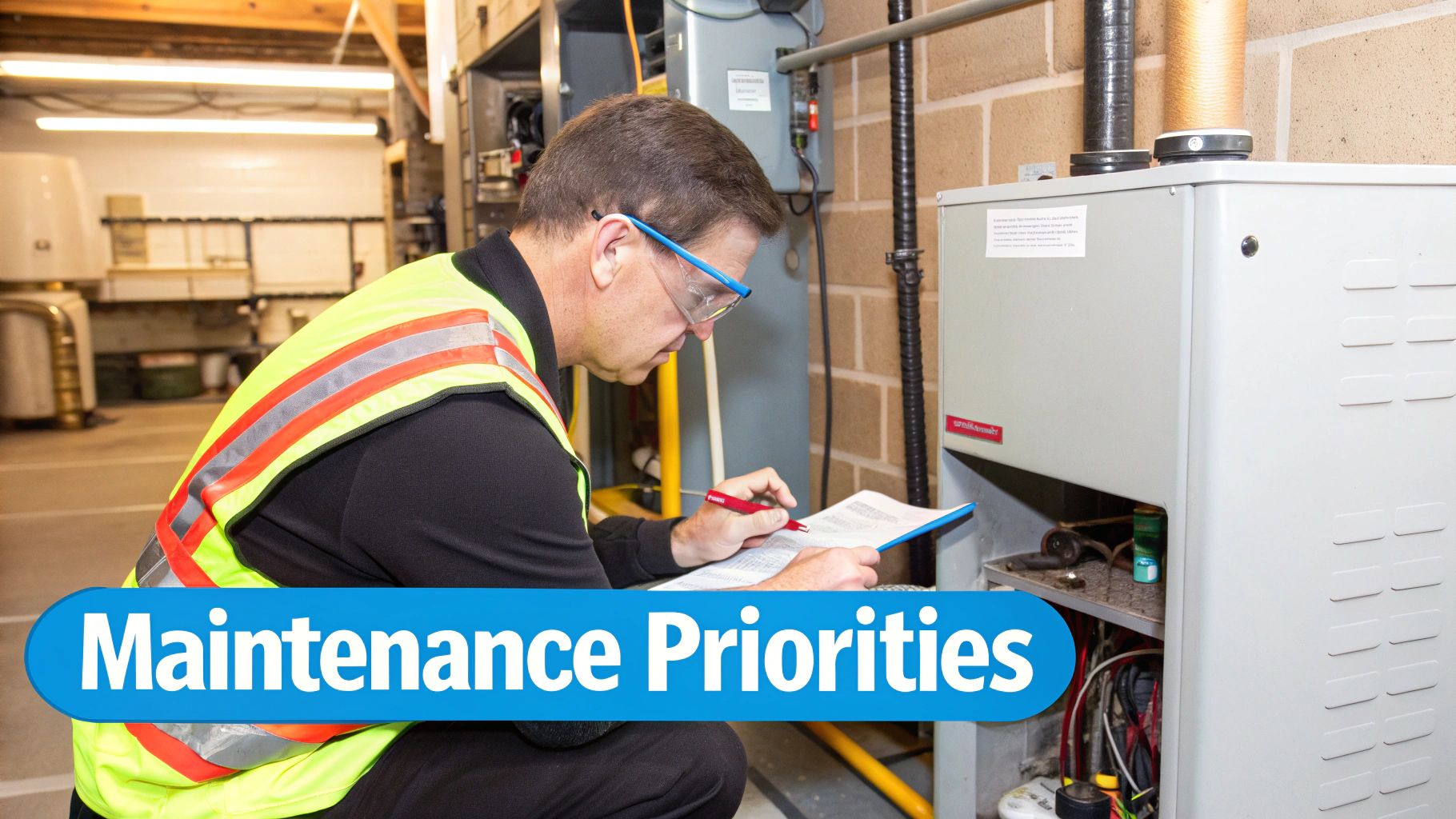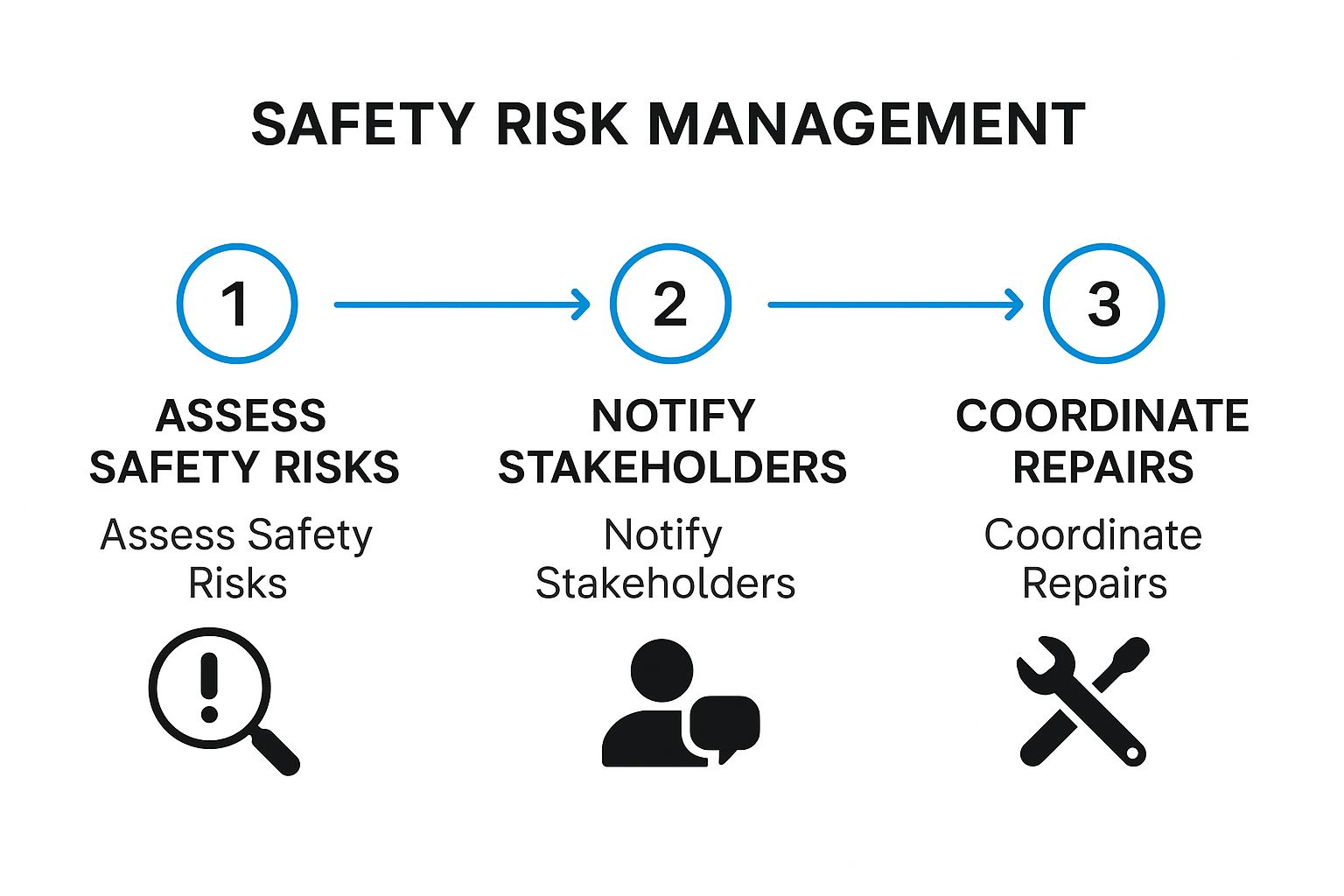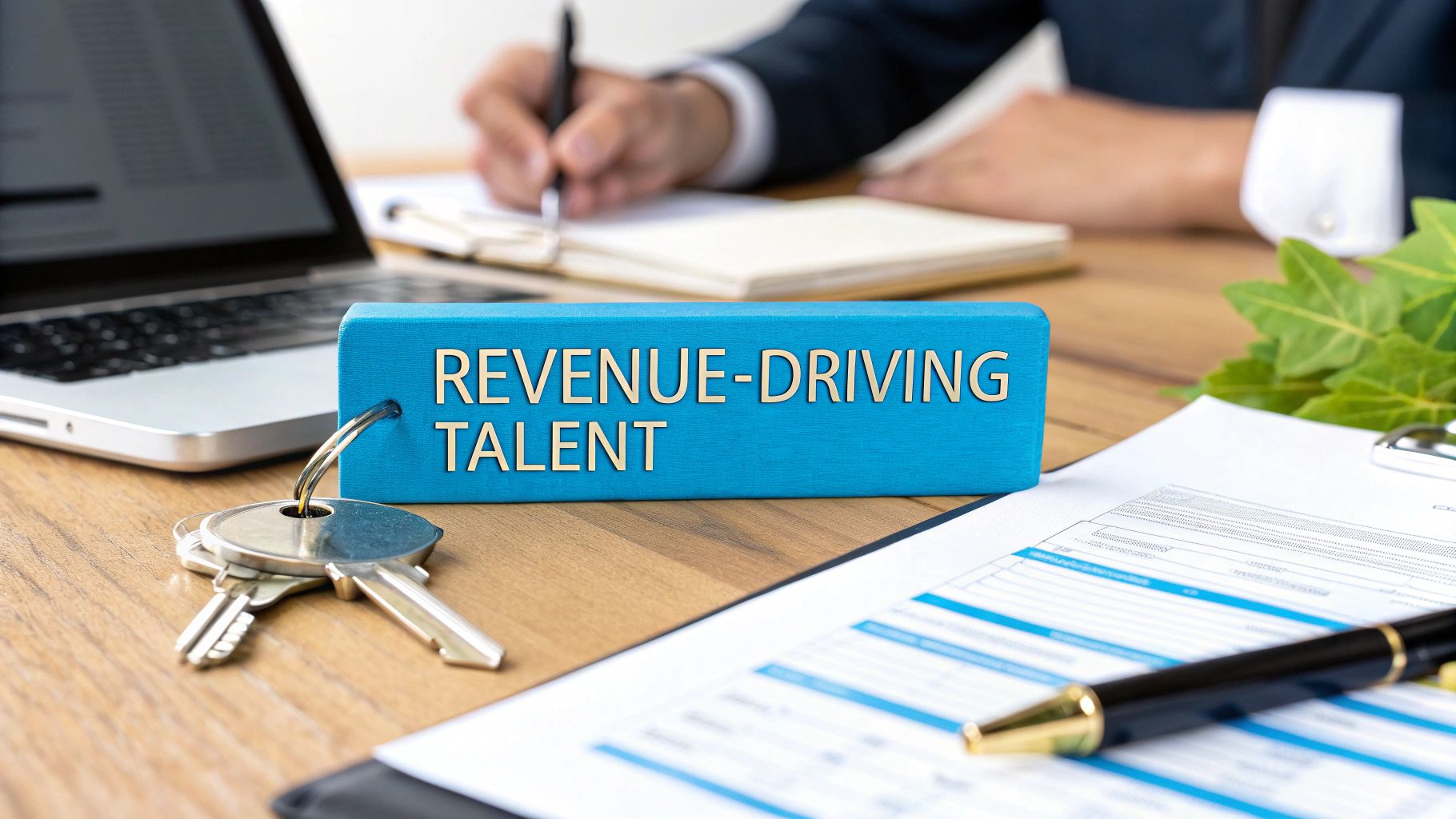For property management companies managing hundreds or even thousands of units, a single hiring mistake isn't just an HR issue—it's a direct hit to portfolio revenue. A property manager who can't optimize for speed-to-lease will inflate your Days on Market (DOM), a metric that directly correlates to lost income. For a portfolio of 1,000 units with an average rent of $2,000, just one extra vacancy day per unit per year costs over $65,000 in lost revenue. Traditional interview questions often fail to identify candidates with the specific, scalable skills needed for remote, large-scale operations. They test for basic competency but miss the key performance indicators that drive profitability.
This guide provides a curated list of essential property manager interview questions designed to uncover a candidate's true potential to impact your bottom line. We move beyond generic inquiries to focus on the core competencies that matter at scale: operational efficiency, vacancy cost reduction, and lead-to-tour conversion optimization. You will learn how to ask questions that reveal a candidate's proficiency with metrics-driven performance, technology adoption, and scalable process management. These are the skills that separate a manager who simply maintains properties from one who actively enhances asset value. Let’s explore the questions that will help you hire talent capable of measurably improving your portfolio's financial performance and operational excellence.
1. Tell me about your experience managing properties and what types of properties you've worked with
This foundational question is more than just an icebreaker; it’s a strategic inquiry designed to quickly assess if a candidate’s background aligns with the complexities of a large-scale, distributed portfolio. For companies managing scattered single-family rentals (SFRs) or multifamily units without onsite staff, the answer reveals their operational versatility and immediate value. A candidate who has only managed a single, 50-unit building with an onsite team will face a steep learning curve in a remote-first, 1,000-unit environment.
A strong candidate won't just list previous jobs. They will provide a structured, quantifiable overview of their career that directly addresses the challenges of managing large, often dispersed, portfolios.
What to Listen For in a Candidate's Answer
A compelling response should demonstrate scalability, process-orientation, and a clear understanding of portfolio diversity.
- Quantifiable Scope: Listen for specific numbers that demonstrate experience at scale. An answer like, "I managed a portfolio of 800 single-family rentals across three states, reducing average make-ready time by 15%," is far more impactful than, "I have experience with residential properties." Key metrics include the number of units, geographic spread, and staff managed.
- Operational Process: A great candidate will touch upon the how of managing at scale. This includes their experience with centralized leasing, automated rent collection systems, and coordinating vendors across a wide territory. Experience with routine inspections is crucial for asset protection; a candidate who mentions using a comprehensive Rental Property Inspection Checklist shows they are systematic and detail-oriented.
- Relevance to Your Portfolio: The candidate should connect their past experience directly to the role. If you manage remotely-managed multifamily buildings without onsite staff, they should highlight their experience in that specific environment, emphasizing skills in remote tenant communication and vendor management.
Interviewer Tip: Ask follow-up property manager interview questions based on their response. If they mention managing student housing, ask, "How did you standardize the high-volume turnover and make-ready process to minimize vacancy days between leases?" This probes their problem-solving skills in specific, high-pressure scenarios relevant to large-scale operations.
2. How do you handle difficult tenants or residents, and can you give me an example?
This behavioral question is designed to test a candidate's conflict resolution skills, emotional intelligence, and ability to operate professionally under pressure. For large-scale property management companies, a single poorly handled dispute can escalate into a legal issue, damage a property's reputation, or negatively impact tenant retention across a building or portfolio. This inquiry reveals if a candidate can protect the asset and the community while adhering to company policy and fair housing laws, all without the benefit of face-to-face interaction common in smaller operations.
A top-tier candidate will go beyond a simple story. They will frame their example using a structured problem-solving approach, demonstrating a clear, repeatable process for de-escalation and resolution that can be applied consistently across a large and diverse portfolio.

What to Listen For in a Candidate's Answer
A strong response will showcase a balance of empathy, firmness, and procedural knowledge. Look for evidence that the candidate can navigate complex situations systematically.
- Structured Problem-Solving: The best answers often follow the STAR method (Situation, Task, Action, Result). For instance, "We had a tenant in a remotely managed property who was consistently late on rent (Situation). My task was to collect payment while avoiding eviction and maintaining a positive relationship (Task). I initiated a documented conversation via our tenant portal, listened to their circumstances, and established a formal, written payment plan in line with company policy (Action). The result was that the tenant caught up on all arrears within two months and paid on time thereafter, preventing a costly turnover (Result)." This structure demonstrates logical thinking, not just reactive emotion.
- De-escalation and Empathy: A skilled property manager knows that listening is the first step. Listen for phrases like, "I started by listening to their concerns to understand their perspective," or "I validated their frustration before explaining the policy." This shows an ability to de-escalate tension, which is critical for maintaining a stable community and avoiding unnecessary turnover.
- Policy and Legal Adherence: The candidate’s actions must align with lease agreements, company policies, and fair housing regulations. They should articulate how they balanced enforcing rules (e.g., noise complaints, unauthorized occupants) with finding a fair resolution. A great answer will emphasize documentation and consistent application of the rules to all residents, which is vital for risk management at scale.
Interviewer Tip: Present a hypothetical scenario relevant to your portfolio. For example, "Imagine a tenant in one of our remote single-family rentals reports a non-emergency maintenance issue on a Friday night and is demanding immediate service. How would you handle the communication and manage their expectations over the weekend?" This tests their real-time problem-solving and communication skills in a context that mirrors your operational challenges.
3. What is your approach to property maintenance and how do you prioritize maintenance requests?
A property manager's approach to maintenance is a direct reflection of their operational efficiency and ability to protect asset value. For large-scale portfolios, a disorganized or purely reactive maintenance strategy can lead to catastrophic budget overruns, decreased tenant retention, and significant asset depreciation. This question reveals a candidate's ability to create and manage a scalable, systematic maintenance program that balances tenant satisfaction with cost-per-door efficiency.

A top-tier candidate will articulate a proactive, multi-layered strategy that includes preventive measures, a clear triage system, and robust vendor management, all while keeping a close eye on the budget. Their answer should demonstrate an understanding that maintenance is not just a cost center but a critical component of portfolio performance.
What to Listen For in a Candidate's Answer
A strong response will showcase a structured, proactive, and tech-enabled approach to managing maintenance across a dispersed portfolio.
- A Clear Triage System: The best candidates will describe a priority-based system. This usually involves categorizing requests as: Emergency (e.g., major water leaks, no heat in winter), Urgent/Safety (e.g., broken lock, non-functioning smoke detector), Standard (e.g., dripping faucet, appliance repair), and Cosmetic (e.g., minor paint touch-ups). This shows they can allocate resources effectively and manage tenant expectations at scale.
- Emphasis on Preventive Maintenance: A standout candidate will discuss implementing and managing preventive maintenance schedules to reduce reactive, high-cost repairs. Mentioning the importance of semi-annual HVAC maintenance across a portfolio of 500 homes, for example, demonstrates a forward-thinking approach to minimizing costly emergency repairs and extending asset life.
- Vendor Management and Cost Control: Listen for how they vet, manage, and evaluate third-party vendors, especially across multiple markets. Do they have a process for onboarding reliable, insured contractors? How do they ensure competitive pricing without sacrificing quality? A candidate who discusses negotiating bulk pricing or using preferred vendors for a large portfolio shows a grasp of cost-per-door efficiency.
- Tenant Communication: An experienced manager knows that communication is key. They should explain their process for acknowledging requests, providing status updates, and confirming completion with tenants, likely through an automated tenant portal. A clear process is essential for learning how to prioritize tenant maintenance requests effectively and keeping residents satisfied.
Interviewer Tip: Probe their financial acumen with a follow-up question like, "Describe a time you had to handle a major, unexpected capital expense across multiple properties. How did you manage the budget, communicate with stakeholders, and execute the repair project efficiently?" This tests their ability to handle high-stakes financial and operational challenges.
4. How do you ensure high occupancy rates and minimize vacancy periods?
This question cuts directly to the core of a property manager's financial impact. Vacancy is the primary driver of lost revenue for any rental portfolio, and an inability to manage it effectively is a major red flag. This inquiry is designed to assess a candidate's proactive strategies for both tenant acquisition (lead-to-tour conversion) and tenant retention, revealing their understanding of market dynamics, marketing prowess, and obsession with speed-to-lease.
A top-tier candidate will provide a two-pronged answer that addresses both filling empty units quickly and keeping existing tenants happy. They will understand that every day a unit sits empty has a direct, quantifiable cost, and their strategy will reflect an obsession with minimizing Days on Market (DOM) and maximizing resident lifetime value.
What to Listen For in a Candidate's Answer
A strong response will be data-driven and demonstrate a clear, repeatable process for maintaining high occupancy.
- Proactive Marketing and Leasing: The candidate should detail their leasing strategy that starts before a unit is vacant. Do they mention pre-leasing, leveraging a waitlist, or using high-quality virtual tours and on-demand showing solutions to market a property while it's still occupied? They should speak to optimizing listings and lead response times to improve lead-to-tour conversion rates. A candidate who can speak to ways to lease properties quicker and cheaper demonstrates a focus on both speed and cost-efficiency.
- Data-Informed Pricing Strategy: A great answer will involve a discussion of competitive market analysis (CMA). The candidate should explain how they determine rental rates by analyzing comparable properties, market trends, and seasonality, using data from their PMS or tools like Rentometer. They should articulate the balance between maximizing rent and pricing competitively to minimize vacancy duration.
- Emphasis on Tenant Retention: Acquiring a new tenant is significantly more expensive than retaining an existing one. A savvy property manager knows this and will describe their tenant retention programs. Listen for mentions of proactive communication, efficient maintenance request handling, and a structured lease renewal process that begins 90-120 days before expiration.
- Quantifiable Results: The most compelling answers are backed by numbers. A candidate who says, "At my previous company, I maintained a 97.5% portfolio occupancy rate and reduced our average DOM from 21 days to 14 by implementing a same-day showing strategy," is far more impressive than one who simply says they're "good at keeping units full."
Interviewer Tip: For one of your key property manager interview questions, ask a targeted follow-up like, "Describe a property that had stubbornly high DOM. What data did you analyze, what specific steps did you take to turn it around, and what was the quantifiable impact on revenue?" This pushes them beyond theory and into real-world application, revealing their problem-solving and strategic thinking abilities.
5. Describe your experience with budgeting and financial management for properties
A property manager’s core function is to maximize the financial performance of an owner's asset. This question directly probes a candidate’s financial acumen and strategic thinking, revealing their ability to move beyond day-to-day operations and act as a true asset manager. For companies managing large, distributed portfolios, a manager’s skill in budgeting, expense control, and revenue optimization is directly tied to profitability and scalability.
An exceptional candidate will detail their role in the entire financial lifecycle of a property. They won’t just talk about paying bills; they will discuss creating annual operating budgets, planning for capital expenditures (CapEx), analyzing P&L statements against forecasts, and identifying opportunities to increase Net Operating Income (NOI).
What to Listen For in a Candidate's Answer
A strong response will be data-driven, demonstrating a clear understanding of how financial decisions impact owner returns and operational efficiency across a large number of units.
- Specific Financial Processes: The candidate should outline their hands-on experience with key financial tasks. Listen for keywords like "annual budget creation," "variance analysis," "general ledger review," and "capital improvement planning." An answer like, "I developed and managed a $2.5M annual operating budget for a 300-unit portfolio, consistently coming in 3% under budget by renegotiating vendor contracts and implementing utility sub-metering," is far more compelling than a generic, "I handled the finances."
- Strategic Cost Control: A top-tier manager balances cost reduction with asset quality. They should provide examples of how they’ve implemented cost-saving initiatives without negatively impacting the tenant experience or the property's long-term value. This could include anything from implementing energy-efficient upgrades to optimizing maintenance workflows to reduce turn costs.
- Technology and Tools: In today’s market, financial management at scale is impossible without the right technology. The candidate should mention their proficiency with enterprise-level property management software (like AppFolio, Yardi, or Buildium) for tracking income, expenses, and generating financial reports like P&L statements and rent rolls.
Interviewer Tip: Use their answer to ask targeted follow-up property manager interview questions. If they mention creating an annual budget, ask, "Can you walk me through your process for forecasting rental income and variable expenses like maintenance for the upcoming year, and what data sources do you use?" This pushes them to detail their analytical and strategic planning skills.
6. How do you stay current with landlord-tenant laws and fair housing regulations?
This compliance-focused question is one of the most critical property manager interview questions you can ask. The answer directly addresses risk mitigation, a core concern for any large-scale property management company. A single fair housing violation or failure to comply with state-specific regulations can lead to severe financial penalties and reputational damage that impacts the entire portfolio. This question cuts through generic statements to reveal a candidate’s proactive approach to legal diligence.
A top-tier candidate will demonstrate a systematic, multi-layered approach to compliance. They understand that legal knowledge is not a one-time certification but an ongoing operational requirement, especially when managing units across multiple jurisdictions with varying local ordinances. Their response should instill confidence that they are a guardian of your company’s legal and ethical standing.
What to Listen For in a Candidate's Answer
A strong response will be specific and action-oriented, showcasing a deep commitment to professional development and risk management.
- Specific Resources and Associations: Vague answers like "I read articles online" are a red flag. A compelling candidate will name their sources, such as, "I'm an active member of the National Apartment Association (NAA) and my state's affiliate, which provides regular legislative updates. I also subscribe to legal newsletters and attend annual fair housing webinars to stay current on evolving case law."
- Proactive System for Dissemination: It's not just about what they know; it's about how they ensure the entire team is compliant. Listen for process-driven answers like, "After attending a legal update seminar, I create a summary of key changes and hold a brief training session with our leasing agents and maintenance coordinators. We then update our standard operating procedures and document templates accordingly." This demonstrates leadership and a scalable approach to compliance.
- Real-World Application: The best candidates will provide a concrete example. For instance, "When our city passed a new 'source of income' protection ordinance last year, I immediately worked with our legal counsel to update our tenant screening criteria and application forms. We rolled out training within a week to ensure all 25 of our leasing agents understood the new compliance requirements, avoiding any potential Fair Housing Act violations."
Interviewer Tip: Probe deeper into their operational knowledge. Ask a follow-up question like, "Describe a time you had to handle a reasonable accommodation or modification request. What was the situation, what steps did you take, and what was the outcome?" This tests their practical application of fair housing laws in nuanced, real-life scenarios.
7. What property management software have you used, and how has it improved your efficiency?
In today's tech-driven landscape, this question is a critical litmus test for a candidate's operational acumen. For property management companies overseeing hundreds or thousands of units, proficiency with Property Management Software (PMS) is non-negotiable. The answer reveals not just technical skill but a deeper understanding of how to leverage technology to drive efficiency, reduce operational drag, and improve key performance indicators like Days on Market (DOM) and cost per door.
A top-tier candidate will go beyond simply listing software like AppFolio or Buildium. They will articulate how they've used these platforms as strategic tools to automate workflows, manage large-scale communication, and generate actionable data for portfolio optimization.
What to Listen For in a Candidate's Answer
A strong response will connect software proficiency directly to measurable business outcomes and demonstrate an aptitude for scalable operations.
- Specific, Outcome-Focused Examples: Listen for answers that tie software features to results. A response like, "Using Yardi's automated rent reminder and collection features, we reduced our average rent delinquency rate by 15% across a 500-unit portfolio," is far more compelling than, "I've used Yardi for rent collection."
- Data-Driven Decision Making: A great candidate will discuss using the reporting and analytics functions of a PMS. They might mention, "I regularly pulled maintenance cost analysis reports from AppFolio to identify recurring issues with specific appliance models, allowing us to make proactive, cost-saving procurement decisions for our properties." This shows a strategic, data-first mindset.
- Scalability and Adaptability: The candidate should express comfort in learning new systems and integrating third-party tools via API. Their experience should show an understanding of which tools work best at different scales. They should be able to discuss the pros and cons of various platforms, and a great way to gauge their industry knowledge is to see if they're familiar with the landscape of the best property management software of 2023.
Interviewer Tip: Probe deeper into their efficiency claims. Ask a follow-up question like, "You mentioned using software to streamline maintenance requests. Can you walk me through the exact workflow from a tenant submitting a ticket to its final resolution and how the software helped at each step?" This reveals their true process-level understanding.
8. How would you handle an emergency situation at the property, such as a water leak or power outage?
This scenario-based question is a critical stress test for any property manager candidate. It moves beyond routine operations to evaluate their ability to think clearly, act decisively, and communicate effectively under extreme pressure. For companies managing large, dispersed portfolios, a property manager’s response to an emergency can be the difference between a contained issue and a catastrophic financial and reputational event.
A strong candidate will demonstrate a systematic, protocol-driven approach. They will prove they can protect the asset, ensure tenant safety, and manage liability without needing hand-holding. Their answer reveals their preparedness, resourcefulness, and understanding of risk management at scale.
What to Listen For in a Candidate's Answer
A compelling response will outline a clear, logical sequence of actions that prioritizes safety and minimizes damage. It should be a structured plan, not a panicked reaction.
- Prioritization of Safety: The first words should always concern the safety of the tenants. A top-tier candidate will immediately mention assessing the situation for immediate dangers, such as electrical hazards with a water leak, and instructing tenants on safety measures.
- Systematic Process: Listen for a step-by-step plan: stop the damage (e.g., shutting off the main water valve), assess the scope, contact emergency vendors from a pre-vetted list, and then communicate with stakeholders. This demonstrates an ability to manage chaos methodically.
- Communication Protocol: An experienced manager knows communication is key. They should detail who they would contact and in what order: tenants, emergency services (if needed), a network of 24/7 contractors, and the property owner. Proactive, clear communication prevents panic and manages expectations.
- Documentation and Follow-Up: A great answer goes beyond the immediate crisis. The candidate should mention documenting the incident with photos and detailed notes for insurance claims and legal records, and scheduling follow-up repairs.
The following infographic illustrates the core three-step emergency response process a proficient property manager should follow.

This streamlined workflow emphasizes that a structured response is crucial for effectively managing emergencies and mitigating potential fallout.
Interviewer Tip: Present a specific, escalating scenario to test their limits. For example, "A pipe burst in a top-floor unit at 2 a.m. on a holiday weekend, and it's affecting three units below. Your go-to plumber isn't answering. What are your next three calls?" This probes their resourcefulness and backup planning, which are essential skills when managing hundreds or thousands of properties.
Property Manager Interview Questions Comparison
From Interview to Impact: Scaling Your Team with Revenue-Focused Talent
Navigating the landscape of property manager interview questions is more than a simple HR exercise; it's a strategic initiative to secure the financial health and operational scalability of your portfolio. The questions detailed throughout this guide are designed to cut through surface-level qualifications and reveal a candidate's true potential to impact your bottom line. Answering "how do you minimize vacancy?" is one thing. Articulating a data-driven strategy to reduce Days on Market (DOM) by a quantifiable percentage is another.
The difference lies in a mindset shift from task management to revenue optimization. A great property manager for a large-scale, distributed portfolio doesn't just handle maintenance requests; they implement preventative maintenance programs that reduce long-term capital expenditures. They don't just screen tenants; they build a lead-to-lease funnel that maximizes conversion rates and minimizes costly vacancy days.
Key Takeaways for High-Growth Portfolios
As you refine your hiring process, keep these core principles at the forefront. The ideal candidate will demonstrate proficiency not just in traditional property management duties, but in the modern, tech-enabled, and metrics-obsessed environment of today's leading firms.
- Focus on Metrics, Not Just Methods: The most impactful candidates speak the language of KPIs. Listen for mentions of DOM reduction, lead-to-tour conversion rates, cost-per-door analysis, and tenant turnover costs. Their ability to connect their daily actions to financial outcomes is the single most important indicator of their value to your organization.
- Prioritize Tech-Savviness and Scalability: In a remote or multi-market operation, technology is the backbone of efficiency. A candidate's fluency with property management software, automation tools, and data analytics platforms is non-negotiable. Probe into how they've used technology to standardize processes and manage portfolios without being physically present at every property.
- Test for Problem-Solving Under Pressure: The emergency scenarios and difficult tenant questions are not just about finding someone who can follow a script. They are designed to reveal a candidate's ability to think critically, mitigate risk, and protect the asset and your company's reputation. Look for responses that balance empathy with firm, legally compliant action.
Core Insight: The goal of a modern property manager interview is to identify individuals who view themselves as asset managers. They understand that every vacant day is lost revenue, every inefficient process bleeds profit, and every positive tenant interaction builds long-term portfolio value.
Actionable Next Steps: Implementing Your New Interview Framework
Armed with these targeted property manager interview questions, your next step is to integrate them into a standardized, repeatable hiring process. This ensures consistency and allows you to objectively compare candidates across the board.
- Create a Scorecard: Develop a simple scorecard for each interview, rating candidates on key competencies like financial acumen, operational efficiency, technology adoption, and legal compliance.
- Involve Key Stakeholders: Include a senior operations manager or portfolio director in the final interview stages to assess the candidate's strategic fit and understanding of enterprise-level challenges.
- Prepare a Case Study: For final-round candidates, present a real-world scenario specific to your portfolio. For example: "A property has been on the market for 45 days with low tour volume. Walk me through your 7-day action plan to diagnose the problem and get it leased."
By systemizing your approach, you transform your hiring process from a subjective gut feeling into a strategic asset. You begin to build a team of A-players who are not just capable of managing properties, but are equipped to drive the growth, efficiency, and profitability of your entire portfolio. This is how you scale successfully.
Now that you know how to hire top talent, empower them with the industry's leading leasing automation platform. Showdigs provides the scalable infrastructure your new property manager needs to slash DOM and convert leads into tours instantly, turning their skills into measurable revenue gains for your portfolio.





.png)
.png)
.png)